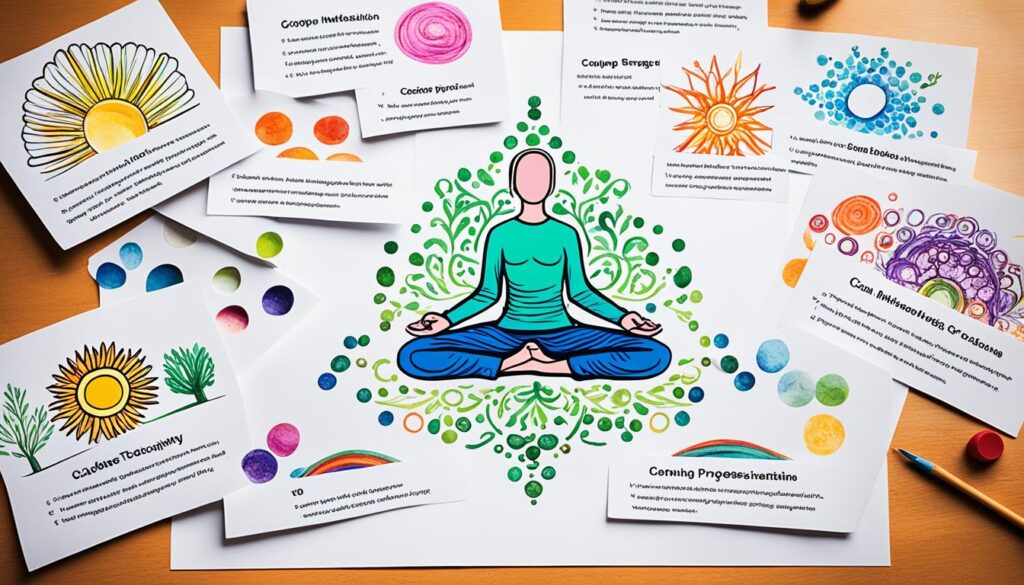Approximately 1.6% of adults in the US have been diagnosed with borderline personality disorder (BPD), which amounts to millions of individuals coping with the difficulties of this intricate mental health condition every day.
Living with borderline personality disorder (BPD) can be overwhelming due to symptoms such as erratic mood shifts, self-harming behaviors, impulsivity, and intense emotional experiences. Coping skills are crucial in managing BPD and reducing emotion dysregulation. Building coping skills can help individuals with BPD regulate their emotions, improve relationships, and reduce harmful behaviors.
Key Takeaways:
- Approximately 1.6% of adults in the United States have BPD.
- Coping skills are essential for managing BPD symptoms.
- Building coping skills can help regulate emotions and improve relationships.
- Coping techniques can assist in reducing harmful behaviors associated with BPD.
- Developing coping skills is crucial for BPD management and improving overall well-being.
The Importance of Coping Skills for BPD Management
Living with borderline personality disorder (BPD) can be challenging due to the core feature of emotion dysregulation. However, effective BPD management strategies can significantly improve the quality of life for individuals navigating BPD recovery journeys.
One key component of BPD management is the development of coping skills. Coping skills enable individuals with BPD to effectively regulate their emotions, enhance their confidence, and reduce emotional distress. These skills also play a crucial role in decreasing harmful behaviors associated with BPD.
By acquiring and strengthening coping skills, BPD individuals can build resilience and improve their functioning, particularly in stressful circumstances. These skills facilitate emotional stability and empower individuals to effectively manage their symptoms on their recovery journeys.
It is important to note that coping skills are not limited to a singular approach. Rather, a variety of strategies may be employed to cater to individual needs and preferences. These strategies can range from practicing mindfulness and engaging in grounding techniques to seeking social support and incorporating art therapy into the BPD management journey.
Developing coping skills is a transformative process that requires patience, practice, and professional guidance. Armed with effective coping strategies, individuals with BPD can regain control of their emotions, improve their well-being, and embark on a path towards recovery.
| BPD Management Strategies | Benefits |
|---|---|
| Mindfulness Practice | Enhances self-awareness and emotional regulation |
| Grounding Techniques | Provides stability and focus during distressing moments |
| Social Support | Mediates stress and fosters healing through connection |
| Music Therapy | Aids in emotional exploration and regulation |
| Art Therapy | Expresses emotions and promotes self-discovery |
Music as a Coping Skill for BPD
Borderline personality disorder (BPD) can be emotionally overwhelming, but incorporating music as a coping skill can provide significant relief and support. Research suggests that music can help individuals with BPD explore and regulate their emotions, offering a valuable self-help technique or supplement to therapy.
One effective way to utilize music as a coping skill is by playing songs that create an opposite emotional experience to what you are feeling. For example, if you are experiencing sadness or anger, listening to uplifting and upbeat songs can improve your mood, increase happiness, and shift your emotional state. Conversely, if you are feeling anxious or overwhelmed, relaxing music can help reduce anxiety, promote calmness, and provide a sense of emotional grounding.
Music has the power to evoke strong emotional responses and can be a powerful tool for self-expression and catharsis. While singing along or playing an instrument, you can channel your emotions into the music, providing an outlet for self-expression and release. Music therapy, which is often incorporated into BPD therapy techniques, utilizes music as a means to support emotional exploration, expression, and regulation.
“Music has the power to evoke strong emotional responses and can be a powerful tool for self-expression and catharsis.”
Music can also serve as a form of distraction, redirecting your focus away from intense emotions or destructive thought patterns. By immersing yourself in the rhythm, melody, and lyrics, you can temporarily shift your attention and find solace in the music’s emotional context. This can provide you with a break from distressing thoughts and help create a more positive and balanced mindset.
Incorporating music into your daily life can be a simple and accessible self-help strategy for managing BPD symptoms. Whether you listen to music while commuting, create playlists for specific moods, or engage in music-making activities, it can offer a powerful and therapeutic way to regulate emotions and promote self-care.
To optimize the benefits of music as a coping skill for individuals with BPD, it is important to be attuned to your personal preferences and emotional needs. Experiment with different genres, artists, and songs, paying attention to how they impact your mood and emotional state. Remember to prioritize self-care and seek guidance from a mental health professional who can provide additional BPD self-help tips and therapy techniques.
By integrating music into your coping repertoire, you can harness its healing power and enhance your emotional well-being, creating a harmonious connection between sound and self.
Exercise and Emotional Regulation for BPD
Regular exercise can be an effective strategy for individuals with borderline personality disorder (BPD) to enhance emotional regulation and improve mood. Physical activity has been shown to have a positive impact on emotional well-being by reducing emotional distress and improving the ability to regulate emotions.
One approach to combining exercise with emotional regulation techniques is through mindfulness-based exercises. Mindfulness, the practice of being fully present in the moment, can help individuals with BPD cultivate awareness of their emotions and develop strategies to manage them effectively. By incorporating mindfulness into aerobic activities like yoga or jogging, individuals can enhance their emotional regulation skills while benefiting from the physical aspects of exercise.
Mindfulness-Based Yoga
Mindfulness-based yoga combines the benefits of both exercise and mindfulness for individuals with BPD. This practice involves integrating mindful awareness with yoga poses, breathing techniques, and meditation. By focusing on the sensations in the body and the breath, individuals can cultivate a sense of calm, reduce stress, and regulate their emotions.
Table: Benefits of Mindfulness-Based Yoga for BPD
| Benefits | Description |
|---|---|
| Enhanced Emotional Regulation | Mindfulness-based yoga helps individuals with BPD develop greater awareness of their emotions and learn to regulate them effectively. |
| Reduced Emotional Distress | The practice of mindfulness-based yoga can decrease emotional distress, reducing symptoms of anxiety and depression often experienced by individuals with BPD. |
| Improved Self-connection | Mindfulness-based yoga promotes self-awareness and a deeper connection with one’s own body, fostering self-compassion and self-acceptance. |
| Relaxation and Stress Reduction | The combination of gentle yoga poses, focused breathing, and meditation cultivates relaxation, reduces stress levels, and promotes overall well-being. |
Zen Jogging
Zen jogging is another way to incorporate mindfulness into exercise for individuals with BPD. This practice involves combining mindful running or jogging with a focus on the present moment. By paying attention to the physical sensations of the body, the rhythm of the breath, and the surrounding environment, individuals can enhance their emotional regulation and experience a sense of peace.
Table: Benefits of Zen Jogging for BPD
| Benefits | Description |
|---|---|
| Increased Mind-Body Connection | Zen jogging helps individuals with BPD cultivate a stronger mind-body connection by focusing on the physical sensations of running or jogging. |
| Reduced Anxiety and Tension | The practice of zen jogging can alleviate feelings of anxiety and tension, promoting relaxation and emotional well-being. |
| Enhanced Mood | Mindful running or jogging can release endorphins, boosting mood and increasing feelings of happiness and well-being. |
| Improved Emotional Resilience | By practicing mindfulness during jogging, individuals with BPD can develop greater emotional resilience and cope with challenging experiences more effectively. |
Integrating exercise with mindfulness techniques can provide individuals with BPD a holistic approach to emotional regulation. Whether through mindfulness-based yoga or zen jogging, these practices offer opportunities to connect with oneself, reduce distress, and enhance well-being.
Adding exercise to your daily routine can be a valuable coping strategy for individuals with BPD. Mindfulness-based exercises, such as mindfulness-based yoga and zen jogging, offer unique ways to combine physical activity with emotional regulation techniques, promoting a healthier mind-body connection and overall emotional well-being.

Behavioral Activation for BPD Coping
When it comes to coping with borderline personality disorder (BPD), developing effective strategies is key. One such strategy that has shown promise in helping individuals with BPD is behavioral activation.
Behavioral activation is a technique used in cognitive-behavioral therapy (CBT) that aims to distract individuals from negative emotions and maladaptive behaviors by engaging them in highly engaging activities. By focusing on meaningful and rewarding activities, behavioral activation helps individuals cope with BPD symptoms and improve emotional regulation.
By participating in activities that bring joy and satisfaction, individuals with BPD can experience a sense of accomplishment, increased positive emotions, and improved overall well-being. Behavioral activation can also help break the cycle of negative thinking patterns, reducing the impact of intrusive thoughts and self-destructive behaviors often associated with BPD.
Implementing behavioral activation as part of a comprehensive treatment plan can provide individuals with BPD the tools they need to cope with their condition more effectively. By engaging in activities that bring fulfillment and happiness, individuals can enhance their emotional well-being and build resilience.
Ultimately, behavioral activation serves as a valuable mental health strategy for those coping with BPD. By focusing on enjoyable and purposeful activities, individuals can redirect their attention from negative emotions, reduce destructive behaviors, and develop healthier coping mechanisms.
Benefits of Behavioral Activation for BPD Coping:
- Distraction from negative emotions: Engaging in highly engaging activities assists in redirecting attention and breaking the cycle of negative thought patterns.
- Improved emotional regulation: Participating in activities that bring joy and satisfaction can enhance emotional well-being and increase positive emotions.
- Reduced maladaptive behaviors: Behavioral activation helps individuals decrease self-destructive behaviors often associated with BPD.
- Enhanced sense of accomplishment: By focusing on meaningful and rewarding activities, individuals with BPD can experience a boost in self-esteem and self-worth.

Implementing behavioral activation as part of an overall treatment plan for individuals with BPD can significantly improve coping and overall mental health. By incorporating engaging activities into daily routines, individuals can effectively manage their emotions and build a foundation for a healthier and more fulfilling life.
Social Support and BPD
Social support plays a critical role in managing borderline personality disorder (BPD) as individuals with BPD often encounter challenges in relationships and face social disadvantages. Building strong social support networks, spending quality time with others, and honing relationship skills through professional treatment can help alleviate symptoms of stress and depression associated with BPD. Seeking out support from others is an integral part of effectively managing BPD.
Benefits of Social Support
Having a solid support system can provide numerous benefits for individuals with BPD. It creates a sense of belonging, reduces feelings of isolation, and offers a safe space to share experiences and emotions. Social support can also enhance self-esteem, foster personal growth, and bolster overall well-being. With the right support structures in place, individuals can feel validated, understood, and empowered to navigate the challenges that come with BPD.
“Surrounding yourself with the right people who offer understanding and compassion can make a world of difference in managing BPD symptoms and maintaining emotional balance.”
BPD Support Groups
BPD support groups provide a valuable platform for individuals with BPD to connect with others who share similar experiences and challenges. These groups offer a nonjudgmental space where individuals can discuss their struggles, share coping strategies, and receive emotional support. BPD support groups can be found both online and in-person, making it easier for individuals to access the support they need.
Improving Relationship Skills
Professional treatment, such as dialectical behavior therapy (DBT), can help individuals with BPD improve their relationship skills. DBT focuses on enhancing interpersonal effectiveness, communication, and boundary-setting. Learning effective relationship strategies empowers individuals to establish healthier connections, effectively manage conflicts, and cultivate fulfilling relationships. Therapists can guide individuals through role-playing exercises, provide feedback, and offer practical tools for building stronger relationships.
Strategies for Cultivating Social Support in BPD Management
| Strategies | Description |
|---|---|
| Join BPD support groups | Connect with others who understand and share similar experiences. |
| Nurture existing relationships | Invest time and effort into maintaining meaningful connections with family and friends. |
| Seek professional therapy | Work with a therapist to improve interpersonal skills and navigate relationship challenges. |
| Engage in social activities | Participate in hobbies, clubs, or community events to expand social networks. |
| Practice active listening | Show empathy and understanding when interacting with others. |
By incorporating these strategies into their lives, individuals with BPD can build a strong support system, foster healthier relationships, and better manage their condition.

Distress Tolerance for BPD Coping
Distress tolerance is a crucial element of emotional regulation when it comes to individuals with borderline personality disorder (BPD). Developing the ability to tolerate distress without resorting to harmful behaviors can help prevent emotional outbursts and promote healthier coping mechanisms.
One technique for building distress tolerance skills is to identify and accept emotions as they arise. By acknowledging and validating our feelings, we can reduce the urge to engage in impulsive or self-destructive behaviors. It’s important to remind ourselves that emotions are temporary and will eventually pass, allowing us to navigate challenging situations with greater resilience.

Utilizing Timers for Distress Tolerance
Another helpful technique for developing distress tolerance in BPD is to use timers. Setting a specific time limit for distressing situations can provide structure and a sense of control. By using a timer, individuals with BPD can gauge their distress levels and challenge themselves to tolerate discomfort for a set period. Gradually increasing the duration can help build resilience and the ability to manage distress more effectively.
“Distress tolerance is about learning to accept and manage uncomfortable emotions without engaging in destructive behaviors. It takes practice, but it can be a powerful tool for individuals with BPD.” – Dr. Emily Hernandez, Psychologist
Developing distress tolerance skills is an important aspect of therapy for BPD. It allows individuals to respond to distressing situations without resorting to harmful behaviors, helping to improve emotional regulation and overall well-being. Through therapy and support, individuals with BPD can enhance their distress tolerance abilities and cultivate healthier coping mechanisms.
Mindfulness and BPD Coping
Mindfulness, a core component of dialectical behavior therapy (DBT), is a valuable coping skill for managing borderline personality disorder (BPD). By focusing on the present moment and accepting thoughts and feelings without judgment, individuals with BPD can cultivate self-awareness and regulate their emotions effectively.
Incorporating mindfulness practices into daily life can have profound benefits for BPD self-care. By staying present and nonjudgmental, individuals can enhance their emotional well-being and reduce impulsive behaviors. Mindfulness allows individuals to observe their thoughts and emotions without getting caught up in them, leading to greater self-control and inner peace.
“A journey of a thousand miles begins with a single step.” – Lao Tzu
Practicing mindfulness can be as simple as taking a few moments each day to focus on the breath and observe the sensations in the body. Engaging in mindfulness meditation or participating in mindfulness-based therapy can provide individuals with BPD a structured framework for cultivating mindfulness skills.
The Benefits of Mindfulness for BPD Coping
Mindfulness offers numerous benefits for managing borderline personality disorder:
- Increased self-awareness: Mindfulness allows individuals with BPD to recognize their thoughts, emotions, and physical sensations without judgment, leading to a deeper understanding of themselves.
- Emotional regulation: By observing emotions without reacting impulsively, individuals can learn to navigate and regulate intense emotions more effectively.
- Reduced impulsivity: Mindfulness practices help individuals with BPD pause and consider their actions, reducing impulsive behaviors that may be harmful or self-destructive.
- Greater acceptance: By practicing nonjudgmental awareness, individuals can develop acceptance of themselves and their experiences, fostering self-compassion and reducing self-criticism.

Integrating mindfulness into daily life takes practice and dedication, but the benefits are worth the effort. By incorporating mindfulness exercises into one’s self-care routine, individuals with BPD can develop a valuable tool for managing their condition and enhancing overall well-being.
Grounding Techniques for BPD Coping
Living with borderline personality disorder (BPD) can be challenging, especially when overwhelmed by distress and anxiety. Grounding techniques offer effective strategies to bring attention back to the present moment, providing stability and focus during difficult times.
Sensory-based grounding techniques are particularly useful for individuals with BPD. These techniques involve engaging the senses to manage overwhelming emotions. Here are a few examples:
- Holding an Object: Find a small object, such as a smooth stone or a stress ball, and hold it in your hand. Focus on its weight, texture, and temperature. This physical grounding technique can help redirect your attention away from distressing thoughts.
- Listening to Noises: Pay attention to the sounds around you. Focus on each sound, whether it’s the chirping of birds, the hum of a fan, or the distant traffic. This auditory grounding technique can help anchor your mind in the present moment.
- Engaging in Relaxing Activities: Participate in activities that promote relaxation and mindfulness. This may include deep breathing exercises, gentle stretching, or taking a warm bath. Engaging in calming activities helps soothe both the mind and body, reducing anxiety and promoting emotional stability.
Remember, grounding techniques are highly individual, and it may take some trial and error to find what works best for you. It’s important to be patient and practice regularly.
“Grounding techniques are like an anchor that keeps you steady amidst the tumultuous waves of BPD. They bring you back to the present moment, grounding you in reality and allowing you to regain control.”
By incorporating grounding techniques into your daily routine, you can develop a valuable skillset to manage distress and regain control during periods of heightened emotion. Practice these techniques whenever you feel overwhelmed to maintain a sense of stability and enhance your overall well-being.

| Grounding Technique | Description |
|---|---|
| Holding an Object | Hold a small object in your hand to redirect your focus from distressing thoughts. |
| Listening to Noises | Concentrate on the sounds around you to anchor your mind in the present moment. |
| Engaging in Relaxing Activities | Participate in calming activities to promote relaxation and reduce anxiety. |
Deep Breathing and BPD Coping
Deep breathing exercises can have a profound impact on managing bipolar disorder (BPD) and promoting overall well-being. By incorporating deep breathing strategies into daily routines, individuals can effectively decrease distress and improve emotional regulation. Let’s explore some techniques that can help you cope with BPD:
Mindfulness-Based Deep Breathing:
One effective approach is mindfulness-based deep breathing, which involves focusing on the sensations of your breath as it enters and leaves your body. Find a comfortable position, close your eyes, and take slow, deep breaths, allowing your abdomen to rise and fall. As you breathe, gently redirect your attention back to the present moment whenever your mind wanders. This practice can help calm your mind, reduce anxiety, and enhance your ability to cope with BPD symptoms.
Progressive Muscle Relaxation:
Another helpful technique for BPD coping is progressive muscle relaxation. Start by tensing the muscles in one part of your body, such as your hands or shoulders, and hold the tension for a few seconds before releasing it while taking a deep breath. Gradually move your focus to different muscle groups, working your way through your entire body. This method promotes relaxation, relieves muscle tension, and encourages a sense of calmness.
By incorporating these deep breathing techniques into your daily routine, you can effectively manage BPD symptoms and experience greater emotional stability. Remember to be patient with yourself as you develop your deep breathing practice and tailor it to your individual needs.

Implementing deep breathing exercises as part of your coping strategies for bipolar disorder treatment can lead to significant improvements in your emotional well-being. Harness the power of your breath to find solace, balance, and resilience amidst the challenges of living with BPD.
Spirituality and BPD Coping
For individuals who are religious or spiritual, incorporating their beliefs and practices into Borderline Personality Disorder (BPD) coping strategies can provide significant support during times of extreme stress. Research suggests that spirituality can positively impact coping, emotions, and overall well-being, offering a valuable resource for those managing BPD.
Engaging in religious ceremonies, prayer, and congregations can provide a sense of community and connection, offering comfort and solace in difficult moments. Spirituality can provide a framework for understanding and finding meaning in life’s challenges, offering hope and guidance on the path to recovery.
“Spirituality is a sanctuary where the soul seeks peace and solace. It can provide individuals living with BPD the strength and resilience needed to navigate the ups and downs of their journey.”
By incorporating spiritual practices such as meditation, reflection, or mindfulness into their daily routine, individuals with BPD can enhance emotional resilience and foster healing. These practices can provide a sense of inner calm, grounding, and self-awareness, helping to regulate emotions and reduce impulsive behaviors.
It is important for individuals with BPD to find their own spiritual path that resonates with them personally. This may involve exploring different belief systems, seeking guidance from spiritual leaders, or participating in support groups centered around spirituality and mental health.
Remember, spirituality is a personal journey, and what works for one individual may not work for another. It is important to approach spirituality with an open mind and allow it to support and complement other coping strategies and professional treatments for managing BPD.
Table: Benefits of Spirituality for BPD Coping
| Benefits | Description |
|---|---|
| Emotional Support | Provides comfort, solace, and a sense of community during challenging times. |
| Meaning and Purpose | Offers a framework for finding meaning and purpose in life’s struggles. |
| Emotional Resilience | Enhances the ability to cope with stress and regulates emotions. |
| Self-Awareness | Fosters self-reflection, inner calm, and acceptance of one’s thoughts and feelings. |
| Guidance | Provides guidance and a sense of direction on the journey to recovery. |
By integrating spirituality into BPD coping strategies, individuals can tap into their inner strength and find support in their beliefs, fostering healing and personal growth. It is important to explore different spiritual practices and find what resonates with your own values and needs as you navigate the challenges of BPD.

Conclusion
Living with borderline personality disorder (BPD) can be a challenging journey, but there is hope for a fulfilling life. Understanding BPD and developing effective coping strategies is key to managing its symptoms and improving overall well-being.
Building coping skills is essential in navigating the emotional rollercoaster that comes with BPD. Seeking professional help from therapists experienced in BPD treatment can provide guidance and personalized strategies for managing symptoms.
Additionally, developing a support network of understanding friends, family, or joining BPD support groups can provide a sense of belonging and reduce feelings of isolation. Taking care of oneself through self-care practices like engaging in music, exercise, mindfulness, and grounding techniques can greatly contribute to emotional regulation and overall mental well-being.
Remember, the journey of living with BPD is a continuous process of growth, healing, and self-compassion. By embracing these strategies, individuals with BPD can lead meaningful lives, rich with understanding, support, and resilience.
FAQ
What are some coping skills for individuals living with borderline personality disorder (BPD)?
Coping skills for BPD include music therapy, regular exercise, behavioral activation, seeking social support, practicing distress tolerance, incorporating mindfulness, utilizing grounding techniques, engaging in deep breathing exercises, and exploring spirituality.
How can music be used as a coping skill for BPD?
Music can help individuals with BPD regulate their emotions. Playing music that creates an opposite emotion to what one is feeling can be helpful. Upbeat songs can improve mood, while relaxing music can reduce anxiety.
Does exercise help with emotional regulation for individuals with BPD?
Yes, regular exercise can have a positive impact on mood and emotional regulation. Physical activity may improve emotional regulation ability and reduce emotional distress. Combining mindfulness practices with aerobic activity can further enhance emotional regulation skills.
What is behavioral activation and how does it help individuals coping with BPD?
Behavioral activation is a strategy used in cognitive-behavioral therapy (CBT) to help individuals with BPD develop more effective coping strategies. It involves engaging in highly engaging activities that distract from negative emotions and maladaptive behaviors. Behavioral activation can improve emotional regulation and aid in coping with BPD symptoms.
Why is social support important for individuals with BPD?
Social support is essential for individuals with BPD as they often experience relationship difficulties and social disadvantages. Building social support networks, spending time with others, and improving relationship skills through professional treatment can mediate symptoms of stress and depression in BPD.
How can individuals with BPD develop distress tolerance?
Techniques such as identifying and accepting emotions, reminding oneself that emotions are temporary, and utilizing timers can help individuals with BPD develop distress tolerance skills. Distress tolerance is a key aspect of emotional regulation for individuals with BPD.
What is mindfulness and how does it help individuals with BPD?
Mindfulness, a core component of dialectical behavior therapy (DBT), involves focusing on the present moment, accepting one’s thoughts and feelings without judgment. Incorporating mindfulness practices can increase self-awareness, regulate emotions, and reduce impulsive behaviors. Mindfulness is a valuable coping skill for BPD.
What are grounding techniques and how can they help individuals with BPD?
Grounding techniques help individuals with BPD cope with distress and anxiety by bringing attention back to the present moment. Sensory-based grounding techniques such as holding an object, listening to noises, or engaging in relaxing activities can help manage overwhelming emotions. Grounding techniques provide a sense of stability and focus during challenging times.
How does deep breathing help individuals coping with BPD?
Deep breathing exercises can significantly impact emotions, mood, and anxiety levels. Utilizing deep breathing strategies can decrease distress and promote well-being. Deep breathing is a simple yet effective relaxation method that can be incorporated into daily BPD coping routines.
Can spirituality play a role in coping with BPD?
For individuals who are religious or spiritual, engaging in religious ceremonies, prayer, and congregations can provide significant support during times of extreme stress. Research suggests that spirituality can positively impact coping, emotions, and overall well-being. Incorporating spiritual practices into BPD coping strategies can enhance emotional resilience and foster healing.









